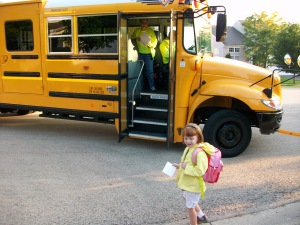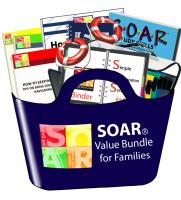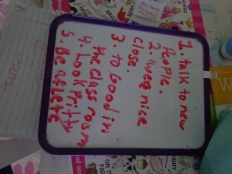By Leslie Lindsay (image source: jestais.com 8.11.13 The back-to-school supply kits* have arrived! My daughters, a soon-to-be-third grader (with resolving CAS) and soon-to-be-first grader shuffled through the supplies, adding labels, and getting organized in school boxes, and backpacks. It’s a tradition, a rite of passage, if you will. And one that goes on the books as “getting ready for the first day.”
The back-to-school supply kits* have arrived! My daughters, a soon-to-be-third grader (with resolving CAS) and soon-to-be-first grader shuffled through the supplies, adding labels, and getting organized in school boxes, and backpacks. It’s a tradition, a rite of passage, if you will. And one that goes on the books as “getting ready for the first day.”
But you may have more on your mind than just school supplies, particularly if you have a child with CAS. Here are a few things I worried about several years ago as I sent my first-born off for the first time:
- “What if she can’t find her way around the school building?”
- “Will she be able to make friends/say her name/ask to join in play?”
- “How will she ask for help?”
- “Can she pronounce the teacher’s name?”
- “Will she be able to keep up academically?”
While I understand many of these anxieties are normal, and some may be more specialized for your child’s developmental level, keep in mind this is a general guide. I’ll do my best to answer in terms of experience and offer some suggestions for you as well–all with the help of my daughter, Kate. Ready?! Let’s do it!
You ask: “What if she can’t find her way around the school buildling?”
Kate & I suggest: Often, schools have “teams/villages/pods/towns” that are color-coded and maybe symbol-coded, too. For example, my daughter’s kindgergarten village was the Green Town and they were the Apples. This color and symbol were pasted on nearly everything in and around her classroom. Make sure your child knows this information if it applies. Also, take your little one to the open-house/meet the teacher day and get acquainted with the school. GIve them as much of a systematic tour as you can. Walk in the same door your child will likely go in each and every day (whether you drop off or she takes the bus). Follow the most direct route to the classroom. Once there, point out identifiers for the classroom, “Oh look! Your teacher must love frogs! Look at all of the froggie decorations.” (or whatever you happen to spot). Kate says, “If you see a person with a name tag on, they are good people to ask if you are lost. Most grown-ups understand, even if you don’t have many words.”
 You ask: “Will she be able to make friends/say her name/ask to join in play?”
You ask: “Will she be able to make friends/say her name/ask to join in play?”
Kate & I suggest: YES!! While I know it seems like a pat answer, it’s not. Young kids need very little verbal interaction to play, or get to know one another. Some of my daughters “best-friends” and playmates have never exchanged names! In our adult world. we think we need to “play” by communicating verbally, but I can’t tell you how often kids will “meet” a friend at a playground, talk about him forever and when I ask, “What’s his name,” they just give me a blank stare. While I undertand classrooms are different, kids can and will play regardless of speaking abilies. Kate says, “Just smile and say hi.”
You ask: “How will she ask for help?”
Kate & I suggest: Practicing will do the trick! Asking for help is one of those “funtional phrases” you’ll need to work with you child(ren) on ahead of time. You can practice at home, at the speech clinic, or both. Having an arsenal of helping/functional words under your child’s belt should do the trick. If your child struggles with this, consider making your own “Boardmaker” type flip ring by printing out some Clip Art from Word, laminating, and cutting into small squares. Punch holes along the top, add a binder ring, and presto–a cheap and easy way to get the message across! Kate says, “Teachers know when you need help. They watch everything!”
You ask: “Will she be able to pronounce the teacher’s name?” 
Kate & I suggest: Maybe. When we first started our educational journey with apraxia, Kate’s teacher was Ms. Circelli. It was hard, even for adults to say! The entire class ended up calling her Miss Lisa (her first name). Your child’s classroom teacher may have a nickname she can suggest. Also, if you’re able to get the teacher’s name ahead of time (most schools do this), start practicing a little bit each day. Kate says, “I had a hard time remembering my first grade teacher’s name, even though it was really easy. Mom made up a rhyme…Mrs. Ross is the boss…and it stuck!”
You ask: “Will he be able to keep up academically?”
Kate & I suggest: “School isn’t any more hard for kids with CAS,” says Kate. Her mom begs to differ! While I am proud of Kate’s insight, I have to back her answer up with a little reality. School will be harder for kids with CAS. If there was a quick and easy answer, I’d give it to you. Truth is, kids with a history of CAS have more difficulty learning to read, rhyme, sound out phonics, and may struggle with the abstract world of numbers (although some kids excel at math–it’s much easier than written and spoken language to them!). Work with your child in the last few days leading up to school in sitting still, holding a pencil, doing worksheets/workbooks, etc. Time it…”For twenty minutes, we are going to play school; you can read or work in your workbook, do flashcards.” It will give him the practice he needs to begin taking school seriously again.
COMING UP NEXT WEEK: Making a good first impression, social stories, etc. Till then…SPREAD THE WORD!
For more information on school, see chapters 10-12 of SPEAKING OF APRAXIA, an award finalist publication from Woodbine House, 2012. 
[*In our area, we have the option of having school supplies hand-selected and delivered to our door. It beats the crowds and you are sure to get school-approved supplies]

 (image source: www.hangingoffthewire.com)
(image source: www.hangingoffthewire.com)


 (“Talk to new people, wear nice clothes, do good in the classroom, look pretty, be athletic”)
(“Talk to new people, wear nice clothes, do good in the classroom, look pretty, be athletic”)






